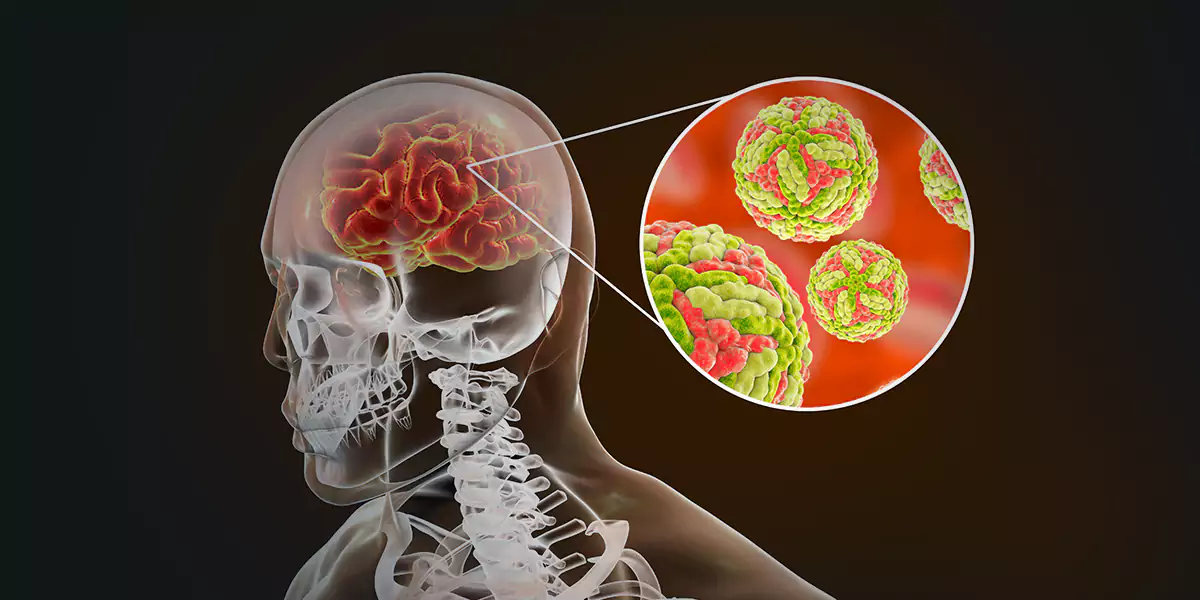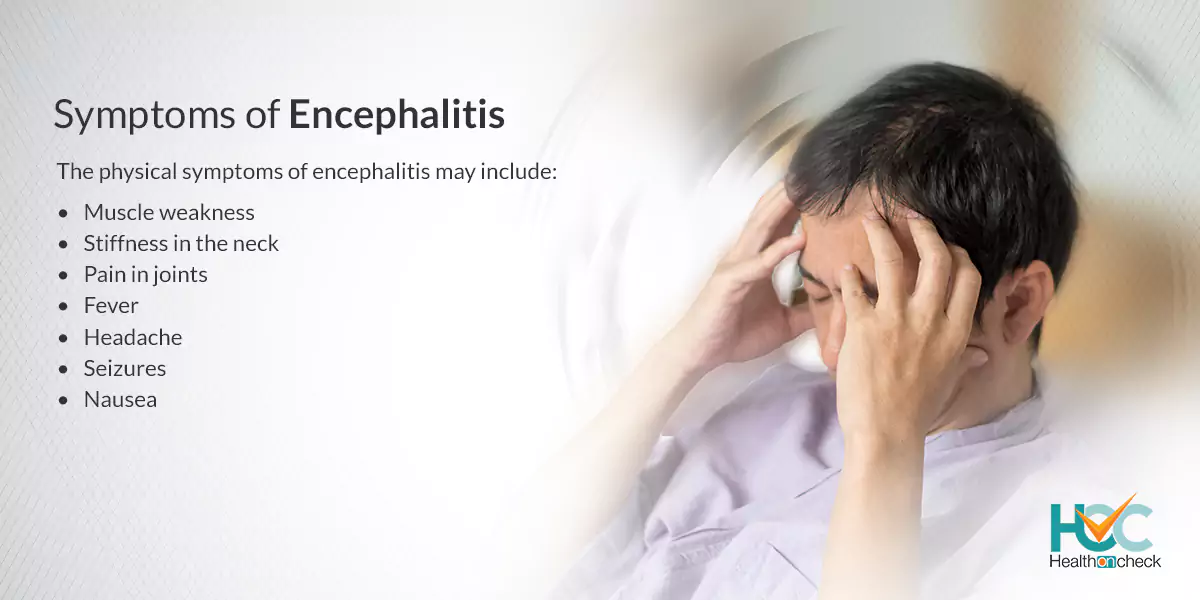All About Encephalitis

What is Encephalitis?
Encephalitis is a brain infection caused by a virus or bacteria, medication, or immune system malfunction which results in inflammation in the brain. It is a rare and serious condition that requires timely treatment otherwise it can be life-threatening. The inflammation in the brain can cause various problems such as headaches, stiff neck, sensitivity to light, mental confusion, and seizures. Younger people are more prone to this condition but it can happen to anyone.
What are the Types of Encephalitis?
There are two main types of encephalitis:
Primary Encephalitis: This type of encephalitis happens when the brain is directly infected by a virus or other agent. The infection may be concentrated in one area or widespread. A virus that had been inactive after a previous illness can reactivate this type of infection i.e. primary infection.
Secondary Encephalitis: This condition occurs when a faulty immune system reacts to an infection from some other area in the body. In place of attacking only the cells that cause the infection, the immune system erroneously attacks healthy cells in the brain. Secondary encephalitis also known as post-infection encephalitis usually arises 2 to 3 weeks after the early infection.

What are the Symptoms of Encephalitis?
The symptoms of encephalitis may be both physical and neurological.
The physical symptoms of encephalitis may include:
- Fever
- Headache
- Seizures
- Nausea
- Stiffness in the neck
- Pain in joints
- Muscle weakness
The neurological symptoms of encephalitis may include:
- Changes in behaviour
- Being confused
- Problems in body movements
- Light sensitivity
- Sound sensitivity
- Loss of consciousness.
- Memory issues.
What are the Causes of Encephalitis?
The causes of encephalitis mostly depend on its type, whether it’s primary or secondary encephalitis. The main causes of encephalitis are:
Viruses: Various types of viruses such as herpes simplex virus, enterovirus, mosquito-borne virus, human immunodeficiency virus (HIV), West Nile, and tick-borne viruses cause viral encephalitis. Viruses are the most common cause of encephalitis.
Immune System Disorder: Sometimes the immune system by mistake attacks the brain which can result in autoimmune encephalitis.
Parasites and bacteria: In some instances, some germs such as parasites and bacteria can cause bacterial encephalitis.

What are the Risk Factors of Encephalitis?
Age: People from certain age groups are at risk of developing some types of encephalitis. For example, young children and older adults are more prone to viral encephalitis.
Weak Immune System: People with diseases such as HIV/AIDS, who have a weak immune system and take immune-suppressing drugs, or who have another disease that may cause a weakened immune system are at increased risk of encephalitis.
Geographical Regions: People who live in areas where mosquitos or ticks are common have higher chances of getting this disease.
Season of the year: Mosquito- and tick-borne diseases tend to be more common in the summertime.
What are the Complications of Encephalitis?
- Constant fatigue
- Weakness or lack of coordination in muscles
- Change in personality
- Memory-related disorders
- Paralysis
- Hearing or vision disorders
- Speech impairments
How to Diagnose Encephalitis?
At first, a doctor will go through a physical examination and your medical history to diagnose encephalitis and after that, he may refer you for some tests such as:
Brain imaging: A brain imaging test that includes MRI or CT images helps to reveal swelling of the brain or another condition that might be creating your symptoms, including a tumor.
Spinal tap (lumbar puncture): Here a needle will be inserted into your lower back and take a small amount of cerebrospinal fluid (CSF), the protective fluid that borders the brain and spinal column which is then sent to a lab for further examination. Changes in this fluid can be a sign of infection and inflammation in the brain.
Other lab tests: Other lab tests include testing the blood test, urine, or excretions from the back of the throat that may help to check for viruses or other infectious agents.
Electroencephalogram (EEG): Here electrodes are attached to your scalp and record the brain’s electrical activity. Certain abnormal patterns may be a sign of encephalitis.
Brain biopsy: In some instances, a small sample of brain tissue is removed and sent to the lab for testing. A brain biopsy is normally done only if symptoms are not getting well and getting worse.
What are the Treatment Procedures Available for Encephalitis?
The treatment depends on the severity and the type of encephalitis.
Both medications and therapies are available to treat encephalitis. Enough bed rest and plenty of fluids are also important to treat this condition.
Medications:
Antiviral drugs
Certain viruses can cause encephalitis and antiviral drugs such as Acyclovir (Zovirax) Ganciclovir (Valcyte, Zirgan, others) Foscarnet (Foscavir) are given for the treatment.
- Antibiotics are given to treat bacterial infections.
- A breathing tube, urinary catheter, or feeding tube is provided if the person’s encephalitis has resulted in the loss of consciousness.
- Intravenous (IV) fluids are given to keep you hydrated.
Therapies
To cope with the complications of encephalitis that may affect your day-to-day life, certain therapies can be helpful which include:
- Physical therapy is helpful to improve strength, flexibility, balance, motor coordination, and mobility.
- Occupational therapy given in some cases helps to develop everyday skills and to use adaptive products that help to do your daily activities.
- Speech therapy helps to relearn muscle control along with coordination to produce speech
- Psychotherapy helps to learn coping strategies and new behavioral skills to improve mood disorders or address personality changes
Living with Encephalitis
Most people with mild cases of encephalitis get well without serious complications. But, in some case, people with encephalitis faces problems concentrating, experience changes in their behavior or speech, and may experience memory loss which affects their everyday life. In most cases, people make a good recovery from encephalitis, but nerve cells in the brain may be damaged which can lead to long-term effects, such as fatigue, irritability, impaired concentration, seizures, hearing loss, memory loss, and blindness. It may take months to even years to recover totally.
Whom to Consult?
If you are experiencing any of the more severe symptoms associated with encephalitides such as severe headache, fever, and change in consciousness, get in touch with your doctor immediately.
If infants and young children are feeling any signs or symptoms of encephalitis then they shall get urgent care.




